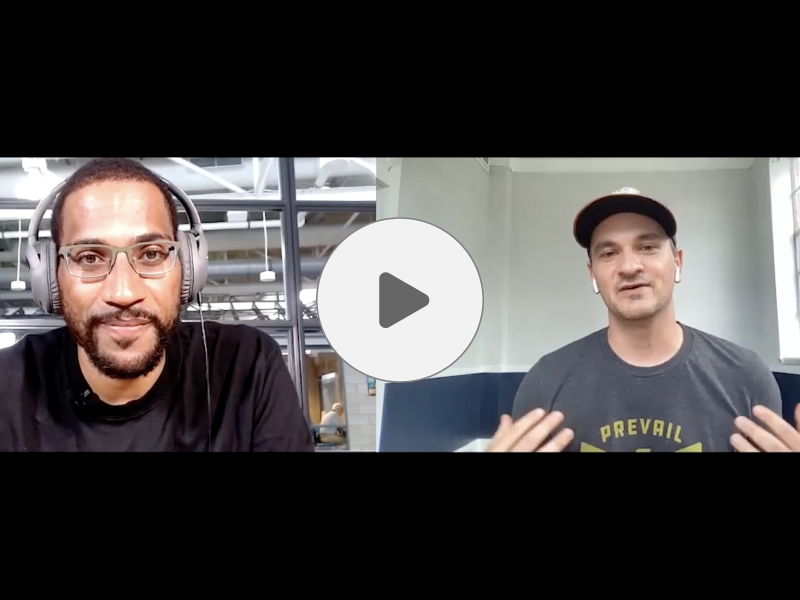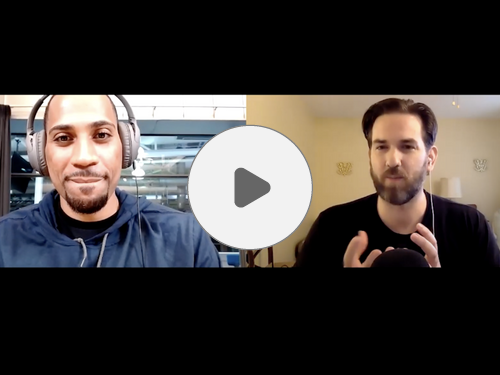TRIBE NAME
Ep7 Left Field Investors
-
Build wealth through ownership
-
Experience and learn together
Julian McClurkin: Hey everybody, Julian McClurkin here with Tribevest. I'm your Chief Storyteller, and today I'm going to be telling a story with Jim Pfeifer. He's actually a part of five different tribes. I have so many questions. Can we start out by knowing some more about you though? Where are you from?
Jim Pfeifer: I grew up in Anchorage, Alaska, and then went to school at Ohio State. Spent a few years traveling around with my job to different places, and then I ended up back in Columbus about 20 years ago.
Julian McClurkin: Anchorage, Alaska, have you ever had reindeer sausage?
Jim Pfeifer: I have. It's delicious.
Julian McClurkin: Guys, do not knock it till you try. As a former financial adviser, I'm sure you can already tell people how to get an LLC, you can already explain to them how to manage their time and manage their assets. Why should they use Tribevest to do these things?
Jim Pfeifer: I don't need Tribevest anymore because I know how to do all those things you mentioned, but I still use it because it just makes the transactions so much smoother. I tell a story... One of the tribes I'm in is with a neighbor of mine. We needed $12,000 for this investment and so he wrote a check. He's too lazy to walk down the street, so he sends his son who rings my doorbell standing there with a check for $12,000. My wife answers the door and this eight year old hands her a $12,000 check made out to me. And she's thinking, “What are she doing? Why are you taking this money from the neighbors?” And that's just an example of how complicated it was before Tribevest was up and running to where it is now. Now if I need that $12,000, I send them a text and say, “I started a new funding round on Tribevest. Take 30 seconds and go click that button,” and they do it.
Julian McClurkin: Can you tell me a little bit more about Left Field Investors.
Jim Pfeifer: Sure, so Left Field Investors is a community we started to educate and help people have networking opportunities for people who are interested in passive investing, mostly in real estate syndications.
Julian McClurkin: Can you explain to our audience what the word syndication means?
Jim Pfeifer: It's basically just pulling together resources. So if there's a $20 million apartment complex, you're probably going to have a $15 million loan so then you have $5 million that you have to bring to the table like if you're buying a house. Well, most people don't have $5 million sitting in their bank account to go buy an apartment like that. So a syndicator is a person who will buy the property in a name of an LLC, but they will go out to investors to raise the $5 million to get the equity for the investment,
Julian McClurkin: How would you say a syndication and Tribe-vesting are similar? How would you say they're different?
Jim Pfeifer: If I'm doing a syndication on my own, generally the minimums are $25,000, maybe -- more likely $50,000 or $100,000. So that's a large amount to invest in something. And so if I'm investing on my own and I do $25,000 or $50,000, I'm only going to be able to do a few investments a year depending on my network and all of that. Where what Tribevest helps with is I can then team up with other people, and instead of having a $25,000 minimum… One of my tribes, we have five people. So now I can get into that same deal for $5,000, and the power of that is diversification. And in Left Field Investing, what we talk about is diversifying by sponsor. So the syndicator, the group that's doing the investing, we diversify by geography, so different markets around the country. And then we diversify by asset class, whether it's multi-family, mobile homes, self-storage, ATMs... I mean, there's a bunch of different asset classes so what Tribevest does is it allows people to get into more deals with less money, which means you can diversify so you're not all in on one market, one sponsor, one deal.
Julian McClurkin: What can you tell me about your podcast?
Jim Pfeifer: Yeah, so it's called Passive Investing from Left Field. And really what we do is try to get on sponsors, syndicators, people that have different investments to offer. And then also, I try to have on just regular people, regular passive investors and just kind of tell their story. Now it's becoming easier and easier with the changes to SEC regulations for regular people to get into it. So the podcast is really about spreading the word of Left Field Investors. I mean I really enjoy helping people. I was a teacher for a while. I was a financial advisor, and what I wanted to do there was teach people about money and help them. You only know about the stock market and how to make money that way, but there's other ways to build wealth. And I think much better ways to build wealth and that's real estate, real assets that produce real income. And Tribevest helps with that because it allows people who don't have -- I think Travis mentioned the Country Club Set -- the people that can afford a $25,000 investment. But getting someone whose only investment is their 401k, and then they use their house as the bank also, getting those people into this. It is gratifying. It is fulfilling because I know that we're creating wealth, and this will help them in the future. We're not trying to get rich just for the sake of getting rich. But people in this kind of area talk about time freedom. That's what I'm building for. I don't need wealth for the money. I want wealth so I can do what I want to do when I want to do it, and that's time freedom. That's freedom from the W2. And that's kind of what we're building with Left Field Investors and that's what the podcast talks about, is how to build that wealth.
Julian McClurkin: You have five different tribes. For me, it's a little exhausting just to think about managing one tribe? How are you able to manage five?
Jim Pfeifer: It's really Tribevest that makes it easy. There isn't much to do. When we need to have capital because we want to do an investment, we just say “Hey during the capital call, we agreed we're going to put in X amount of dollars this year. We need this to get into this deal. Go on Tribevest.” It takes two clicks to fund that round because all you have to do is start a funding round, and then everyone just contributes the money, and then we go and we wire the money to the deals.
Julian McClurkin: Can you tell me maybe about some of the small wins or big accomplishments that you've been able to see within these tribes?
Jim Pfeifer: Yeah, some of it, it's beginners. One of my tribes, two of my tribes actually, they've never done this before. And just to see the reaction from the fellow tribe members when we got our first LLC and they learned what an EIN was. And we got to name the tribe, and we're all voting on what's the name of our tribe. It was really exciting because most people don't really know what an LLC is, and they're forming a business, and now they're actual business owners. And then when we went and we bought our first syndication. And they're like, “Okay, now we own an apartment,” and three months later, we got our first check. And I sent out an email to everybody and said “hey we're cash flowing now.” And it was maybe $300 divided by 11 people, so it's not like... you're not going crazy, but some of the people were so excited to be part of this and to have another stream of income that they never envisioned they would have other than their W2 income. So it's really interesting to see how excited people get at each different stage. Yeah, that's really cool.
Julian McClurkin: Wow, what a great interview. I could talk to Jim all day because he's such a huge wealth of knowledge. Look, you guys should check out his podcast at LeftFieldInvestors.com. And to learn more about Tribevest, go to Tribevest.com. Alright, till next time, see you next tribe. Peace.
More Featured Tribes
Coffee lovers in the Deep South build community through ownership.
Brian is building a strong, diverse portfolio with like-minded passive investors.
Being a female investor seemed taboo. Now she is leading the way.
Paul pools money to become a lender for his own real estate investments.
Left Field Investors is dedicated to educating and assisting like-minded investors.





